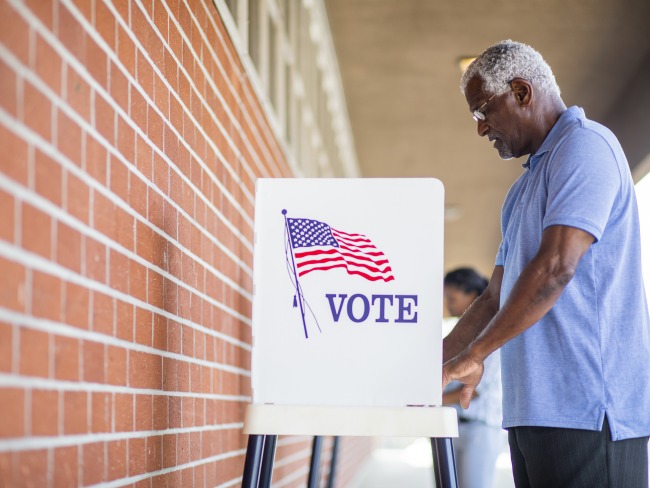Voting Rights in the Era of Mass Incarceration: A Primer
As of 2020, 5.2 million Americans were prohibited from voting due to laws that disenfranchise citizens convicted of felony offenses. Felony disenfranchisement rates vary by state, as states institute a wide range of disenfranchisement policies.
Related to: Voting Rights

Overview
As of 2020, 5.2 million Americans were prohibited from voting due to laws that disenfranchise citizens convicted of felony offenses.1 Voting rights vary by state, which institute a wide range of disenfranchisement policies.
The 11 most extreme states restrict voting rights for some or all individuals even after they have served their prison sentence and are no longer on probation or parole; such individuals make up over 58% of the entire disenfranchised population. Only Maine, Vermont, Washington DC, and the Commonwealth of Puerto Rico do not restrict the voting rights of anyone with a felony conviction, including those in prison.
Persons currently in prison or jail represent a minority of the total disenfranchised population. In fact, 75% of disenfranchised voters live in their communities, either under probation or parole supervision or having completed their sentence. An estimated 2.2 million people are disenfranchised due to state laws that restrict voting rights even after completion of sentences.1
Rights restoration practices vary widely across states and are subject to the turns of political climate and leadership, which has led some states to vacillate between reform and regression. In Iowa, then-Governor Vilsack issued an executive order in 2005 automatically restoring the voting rights of all persons who had completed their sentences, but this order was rescinded in 2011 by then-Governor Branstad. In 2020, Governor Reynolds signed an executive order automatically restoring voting rights to most people who have completed their sentences.3
In Florida, voters passed a 2018 amendment that restored the voting rights of most people who had completed their sentences. The following year, state legislators made restoration conditional on an individual’s payment of all restitution, fines, and fees, meaning only people who have paid all legal financial obligations have become eligible to vote.4 The Sentencing Project estimates that almost 900,000 people who owe legal financial obligations remain disenfranchised in the state.1 Voting rights advocates have called the move a “poll tax” and a “pay to vote” system.6
In addition to Florida, three other states (Alabama, Arizona, and Tennessee) condition eligibility for the restoration of voting rights on the repayment of legal financial obligations. Tennessee requires that people be up to date on all child support payments in order to regain the right to vote.1
The denial of voting rights has a disproportionate impact on communities of color. Black Americans of voting age are nearly four times as likely to lose their voting rights than the rest of the adult population, with one of every 16 Black adults disenfranchised nationally. As of 2020, in seven states – Alabama; Florida; Kentucky; Mississippi; Tennessee; Virginia; Wyoming – more than one in seven Black adults are disenfranchised. In total, 1.8 million Black citizens are banned from voting. In 34 states, the Latinx population is disenfranchised at a higher rate than the general population.1
| 1. | Uggen, C., Larson, R., Shannon, S., & Pulido-Nava, A. (2020). Locked out 2020: Estimates of people denied voting rights due to a felony conviction. The Sentencing Project. https://www.sentencingproject.org/publications/locked-out-2020-estimates-of-people-denied-voting-rights-due-to-a-felony-conviction/. |
|---|---|
| 2. | Uggen, C., Larson, R., Shannon, S., & Pulido-Nava, A. (2020). Locked out 2020: Estimates of people denied voting rights due to a felony conviction. The Sentencing Project. https://www.sentencingproject.org/publications/locked-out-2020-estimates-of-people-denied-voting-rights-due-to-a-felony-conviction/. |
| 3. | Sostaric, K. (2020, August 5). Governor acts to restore voting rights to Iowans with felony convictions. NPR. https://www.npr.org/2020/08/05/899284703/governor-acts-to-restore-voting-rights-to-iowans-with-past-felony-convictions?eType=EmailBlastContent&eId=e2f996b9-6c74-4bd4-9946-854c9813783f. |
| 4. | Uggen, C., Larson, R., Shannon, S., & Pulido-Nava, A. (2020). Locked out 2020: Estimates of people denied voting rights due to a felony conviction. The Sentencing Project. https://www.sentencingproject.org/publications/locked-out-2020-estimates-of-people-denied-voting-rights-due-to-a-felony-conviction/; Florida Senate Bill 7066, (2019). https://www.flsenate.gov/Session/Bill/2019/07066. |
| 5. | Uggen, C., Larson, R., Shannon, S., & Pulido-Nava, A. (2020). Locked out 2020: Estimates of people denied voting rights due to a felony conviction. The Sentencing Project. https://www.sentencingproject.org/publications/locked-out-2020-estimates-of-people-denied-voting-rights-due-to-a-felony-conviction/. |
| 6. | Breslow, J. (2020, May 24). Federal judge rules Florida law restricting voting rights for felons unconstitutional. NPR. https://www.npr.org/2020/05/24/861776313/federal-judge-rules-florida-law-restricting-voting-rights-for-felons-unconstitut; Anderson, C. (2020, September 11). Judges: Florida felons can’t vote until they pay fines, fees. Associated Press. https://apnews.com/article/florida-voting-rights-elections-courts-voting-b4f68dd4f11a6df4430fbdc74ae93de3. |
| 7. | Uggen, C., Larson, R., Shannon, S., & Pulido-Nava, A. (2020). Locked out 2020: Estimates of people denied voting rights due to a felony conviction. The Sentencing Project. https://www.sentencingproject.org/publications/locked-out-2020-estimates-of-people-denied-voting-rights-due-to-a-felony-conviction/. |
| 8. | Uggen, C., Larson, R., Shannon, S., & Pulido-Nava, A. (2020). Locked out 2020: Estimates of people denied voting rights due to a felony conviction. The Sentencing Project. https://www.sentencingproject.org/publications/locked-out-2020-estimates-of-people-denied-voting-rights-due-to-a-felony-conviction/. |



